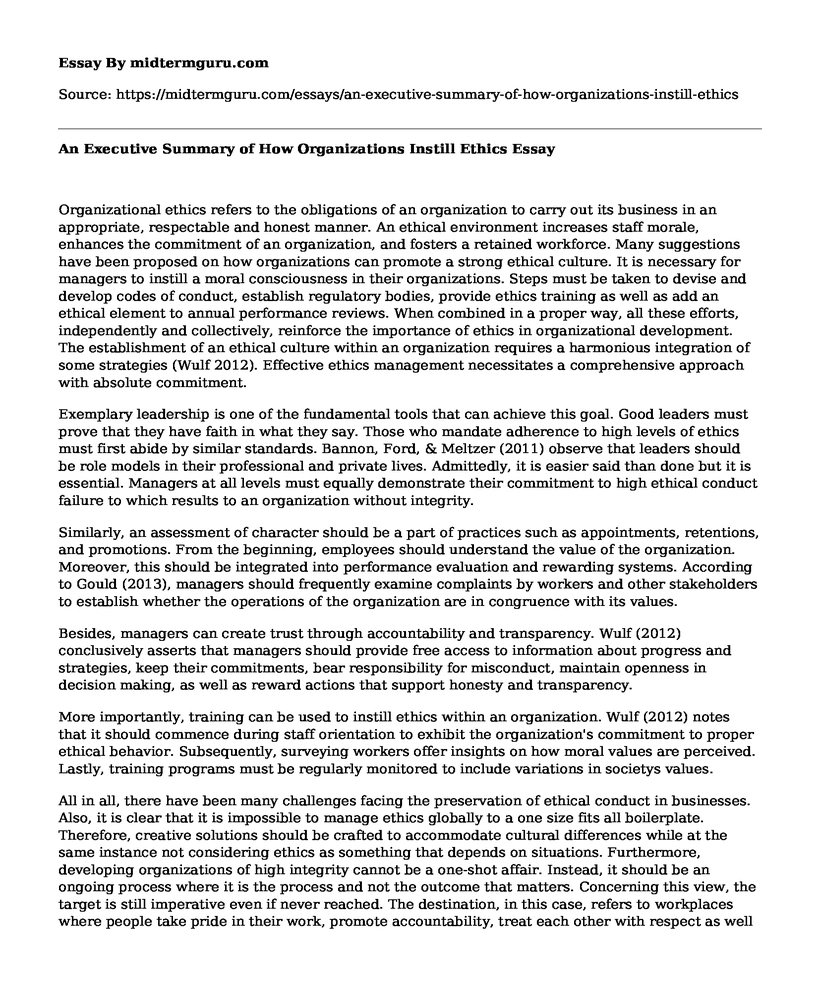Organizational ethics refers to the obligations of an organization to carry out its business in an appropriate, respectable and honest manner. An ethical environment increases staff morale, enhances the commitment of an organization, and fosters a retained workforce. Many suggestions have been proposed on how organizations can promote a strong ethical culture. It is necessary for managers to instill a moral consciousness in their organizations. Steps must be taken to devise and develop codes of conduct, establish regulatory bodies, provide ethics training as well as add an ethical element to annual performance reviews. When combined in a proper way, all these efforts, independently and collectively, reinforce the importance of ethics in organizational development. The establishment of an ethical culture within an organization requires a harmonious integration of some strategies (Wulf 2012). Effective ethics management necessitates a comprehensive approach with absolute commitment.
Exemplary leadership is one of the fundamental tools that can achieve this goal. Good leaders must prove that they have faith in what they say. Those who mandate adherence to high levels of ethics must first abide by similar standards. Bannon, Ford, & Meltzer (2011) observe that leaders should be role models in their professional and private lives. Admittedly, it is easier said than done but it is essential. Managers at all levels must equally demonstrate their commitment to high ethical conduct failure to which results to an organization without integrity.
Similarly, an assessment of character should be a part of practices such as appointments, retentions, and promotions. From the beginning, employees should understand the value of the organization. Moreover, this should be integrated into performance evaluation and rewarding systems. According to Gould (2013), managers should frequently examine complaints by workers and other stakeholders to establish whether the operations of the organization are in congruence with its values.
Besides, managers can create trust through accountability and transparency. Wulf (2012) conclusively asserts that managers should provide free access to information about progress and strategies, keep their commitments, bear responsibility for misconduct, maintain openness in decision making, as well as reward actions that support honesty and transparency.
More importantly, training can be used to instill ethics within an organization. Wulf (2012) notes that it should commence during staff orientation to exhibit the organization's commitment to proper ethical behavior. Subsequently, surveying workers offer insights on how moral values are perceived. Lastly, training programs must be regularly monitored to include variations in societys values.
All in all, there have been many challenges facing the preservation of ethical conduct in businesses. Also, it is clear that it is impossible to manage ethics globally to a one size fits all boilerplate. Therefore, creative solutions should be crafted to accommodate cultural differences while at the same instance not considering ethics as something that depends on situations. Furthermore, developing organizations of high integrity cannot be a one-shot affair. Instead, it should be an ongoing process where it is the process and not the outcome that matters. Concerning this view, the target is still imperative even if never reached. The destination, in this case, refers to workplaces where people take pride in their work, promote accountability, treat each other with respect as well as prioritize public interest over organizational and individual self-interests. Moreover, there is no checklist for forming organizations of integrity. Therefore, it is imperative to oblige public managers to engage in exemplary leadership, sponsor moral codes, advocate for ethics training, as well as find ways to push for an ethical environment by making use of human resources.
References
Bannon, S., Ford, K., & Meltzer, L. (2011). How to instil a strong ethical culture: economic downturns represent an opportunity. Development and Learning in Organizations: An International Journal, 25(1). doi:10.1108/dlo.2011.08125aad.002
Gould, S. (2013). Ethical Leadership and Developing a Code of Conduct for Organizations | IFAC. Retrieved from https://www.ifac.org/global-knowledge-gateway/ethics/discussion/ethical-leadership-and-developing-code-conduct
Wulf, K. (2012). Ethics and compliance programs in multinational organizations. Retrieved from https://books.google.co.ke/books?id=9nYiS3-8dygC&pg=PA379&dq=Instilling+Ethical+Behavior+in+Organizations&hl=en&sa=X&redir_esc=y#v=onepage&q=Instilling%20Ethical%20Behavior%20in%20Organizations&f=false
Cite this page
An Executive Summary of How Organizations Instill Ethics. (2021, May 20). Retrieved from https://midtermguru.com/essays/an-executive-summary-of-how-organizations-instill-ethics
If you are the original author of this essay and no longer wish to have it published on the midtermguru.com website, please click below to request its removal:
- Nursing Leadership: Enhancing Education of Medication Side Effects to Improve Patient Outcomes
- Forecasting Case Study Paper Example: Urban Planning
- Essay on Performance Measurement Methods
- Strategic Plan of Trader Joes Chain of Grocery Stores - Paper Example
- Essay Sample on Double Vision Company Strategy
- Nurses' Managers: Leadership Styles & Job Satisfaction in Healthcare - Essay Sample
- Creating a Change Management Plan: Lewin's 3-Step Model & Action Research - Essay Sample







